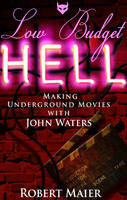Book Review: “Low Budget Hell: MakingUnderground Movies with John Waters”
Written by: FFT Webmaster | October 20th, 2011
 Low Budget Hell: MakingUnderground Movies with John Waters
Low Budget Hell: MakingUnderground Movies with John Waters
By Robert Maier
Full Page Publishing
Davidson, North Carolina
c. 2011
John Waters does not want you to read this book! Why? Well let’s just say that Mr. Waters is revealed, in this compelling and engaging account, to have many flaws that are more reprehensible than simply being known as the “Pope of Trash”. He is defined as a very calculating and ambitious person who stepped on many people on his way to international celebrity and great fortune. Mr. Maier clearly labels him a fop and describes how he sold-out friends who helped him to the top. But, this book is so much more than that.
It is the first book, that I can recall, that explains how difficult and trying it is to make motion pictures outside of the mainstream. It clearly paints a picture of what it was like to make movies in ‘low-budget” hell. Maier describes in excruciating detail how actors and crew worked in the freezing cold and were fed the cheapest fast food (Cokes, cold cheese pizza and soggy meatball subs) that the production could get away with. It also describes time and time again how funding just wasn’t there to pay crew the money they were promised and how he had to battle with vendors to get the best deals possible.
The author, Robert Maier, grew up in Towson, Maryland, a suburb of Baltimore, and, befriended Waters in his first real job after graduating from American University as a “techie” in the film department at UMBC. It seems that Waters was seeking film equipment that would allow him to make his transgressive films on a tiny budget. What better place to get his career going than with Maryland State owned cameras, recorders and editors paid for by taxpayers? It wasn’t long before Mr. Maier hung out drinking and watching Russ Meyers’ movies with Waters at Baltimore’s Rex Theater. He eventually resigned from his college staff position and became a sound recordist and later a production manager on five John Waters’s films starting with Female Trouble and ending with Crybaby.
The book also is a fun romp through 70’s and 80s. Mr. Maier pursues projects without Waters such as a section of the book he labels Andy Warhol’s Cocaine Cowboys where a wanna–be filmmaker named Tom Sullivan blew millions of dollars he made in cocaine running on a film whose primary mission was to make sure that his Danish supermodel girlfriend was living her fantasy as a movie star. Numerous sexual escapades are described and even The Ramones show up to party and play music
Maier meets up with Johnny Depp, Ricki Lake, Andy Warhol, and even Jean-Michel Basquait. He buys a Basquait painting which he sells for 10k at a Sotheby’s auction years later to help bail himself out of debt. He describes carrying 25k in cash on the subway as part of his Low Budget production management duties and facing gunpoint from Federal Narcotics Agents. He relates constantly moving from Baltimore to NYC and the incredible 18-20 hour days he worked for very little monetary remuneration.
The next to last chapter on Crybaby spells out definitively how Maier felt abused and let down as Water’s budgets grew into the millions. He related that it was time to get out and find work in public television and education.
“Low Budget Hell” is an honest and heartfelt account of what it was like to work outside the Hollywood arena. It pulls no punches and will deliver an indelible portrait of the times. It should be mandatory reading for all film majors at our nation’s colleges and universities.


